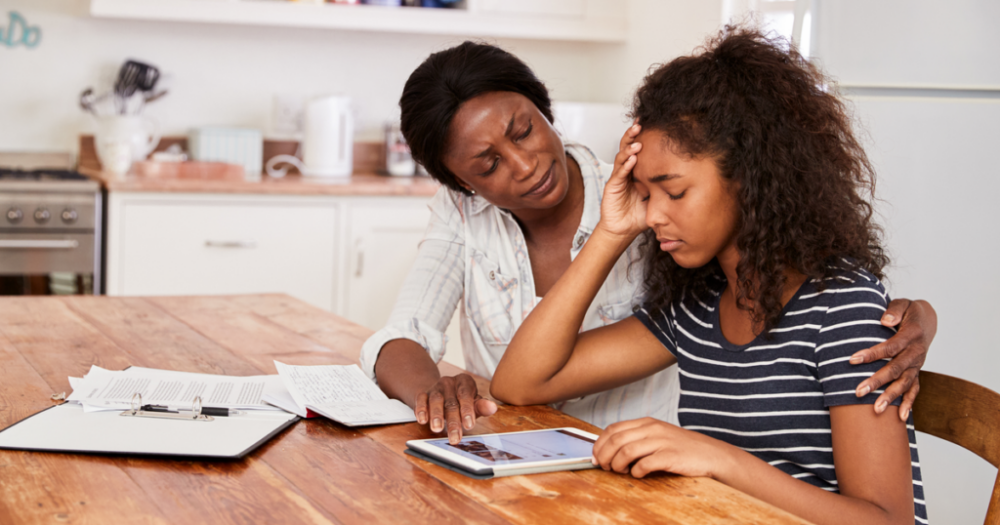Peer pressure has always been something that teenagers and young adults have had to deal with. However, thanks to smartphones and social media, online peer pressure is far more prominent and present than it has ever been before. Online peer pressure can be stressful and/or have a negative impact on kids, so teaching children how to cope with both in-person and online peer pressure is important.
As a parent, one of the most important things that you can do is to help your kids navigate online peer pressure. Unfortunately though, as social media and phones were not around when you were a teenager, you may have no idea how to guide or help your child. Here are some key tips on how to help your kids navigate online peer pressure.
Explain to Your Children What Peer Pressure Is

Source: parentzone.org.
One of the best ways to help your kids navigate online peer pressure is to explain to your kids what peer pressure is. One of the mistakes that parents make is assuming that their children know what peer pressure is.
As a parent, it is best to take the time to explain to your child what peer pressure is in an age-appropriate manner. Take the time to give them age-appropriate examples. The more that they can understand and contextualize what peer pressure is, the more likely they will be to recognize that they are being pressured.
Teach Your Children to Say No
Some people are innately people pleasers. They want to accommodate people. They want to be helpful and they want to be well-liked. For these people, saying no can be challenging. In fact, it can even be hard for adults to say no.
As a parent, you need to teach your child to say no. If they do not want to do something or do not feel comfortable doing something, they need to be able to say no and know that no means no. Teaching your child to say no, and to feel comfortable saying no, can help them when they encounter peer pressure situations.
List Your Expectations to Your Child

Source: pexels.com
It is healthy to have expectations for your child. But, unless you verbalize these expectations to your child, they may not know exactly what you expect from them. When it comes to peer pressure, it is important for your children to know that you have expectations of them and for your kids to be able to state those expectations to someone else. For example, if someone asks them to break curfew, they can tell their friends no because my parents will be disappointed in me.
Build Up Your Child’s Self Esteem
One of the reasons why children give in to peer pressure is because they want to be accepted and liked. Taking the time to build up your child’s self-esteem can help teach them that they are already loved and valuable.
There are many things that you as a parent can do to build up your child’s self-esteem, including praising them. Studies have shown that building a child’s self-esteem makes them more independent and less likely to give in to either in-person or online peer pressure.
Tell Your Kids When to Walk Away or Not Engage

Source: internetmatters.org
Another important way to help your kids navigate online peer pressure is to teach your children that there are situations that you can walk away from or not engage in. Oftentimes, someone who is peer pressuring your child is sending multiple texts or messages. Your child may feel like they have to respond, even if they have already said no. Kids do not want to appear rude.
Your children need your guidance to understand that not every situation deserves a response. Some actions and behaviors can be ignored, walked away from, or not engaged with. Learning when to ignore can help children avoid peer pressure.
Encourage Your Child to Have Healthy Relationships
Relationships that are built around peer pressure are typically not healthy relationships. Unfortunately, children often do not understand what a healthy relationship is, versus what an unhealthy relationship is. As an adult, you need to help contextualize that for your child and help them develop healthy relationships.
Teaching your child how to have healthy relationships and what a healthy relationship is can help your child to recognize healthy versus toxic relationships. This not only helps them with peer pressure situations, but it can help them with relationships later in life.
Be There to Listen To and Guide Your Child

Source: pexels.com
The final way to help your kids navigate online peer pressure is to simply be there to listen to your child and guide them. You want your child to be able to come to you when they feel uncomfortable or are unsure about a situation. The last thing that you want to do is to scare your child or berate them for coming to you. Encouraging open communication allows them to come to you if they feel they are being peer pressured and are unsure of what to do.
According to Gabb Wireless, as a parent, phones for kids definitely have a place. Giving your pre-teen or teenage child a phone allows you to stay in communication with them, track where they are, and ensure they are safe at all times. But the downside of children having phones is that they can be exposed to things that can have a negative impact on them, such as online peer pressure.
While online peer pressure may not be something that you ever had to deal with, it is something that kids today encounter frequently. Teaching your child what online peer pressure is, teaching your child how to say no and mean it, telling your child what you expect of them, building up your child’s self-esteem, teaching your children when to walk away from conversations, helping your child to have healthy relationships and being there to listen and guide your child can be vital to helping them with online peer pressure.


















